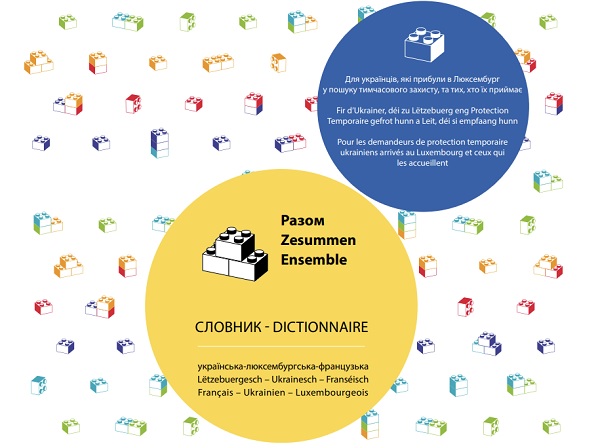
On Friday 16 December 2022, Luxembourg's Minister of National Education, Children and Youth, Claude Meisch, together with the President of ASTI, Evandro Cimetta, launched a dictionary intended for Ukrainian refugees helped by ASTI, covering Ukrainian, Luxembourgish and French.
The launch was actioned during a visit by Minister Meisch to ASTI, were he called in on adult learning classes; the dictionary was co-produced by the ministry and ASTI.
According to the ministry, a total of 4,774 Ukrainians applied for temporary protection in Luxembourg between 1 March and 31 October 2022.
Minister Meisch stated “it is to be feared that the return to Ukraine will be long overdue, however strong the country's nostalgia may be. We must therefore help these new inhabitants of Luxembourg to find their place among us. This is what ASTI is doing which, faithful to its mission and thanks to its volunteers, has once again developed a practical dictionary, a real guide to everyday life”.
For several years, ASTI has taken the initiative to produce basic dictionaries to help people who have recently arrived in the Grand Duchy, in large numbers, after being forced to leave their country due to war or violent internal conflicts.
As early as 2015, during the massive arrival of Syrian refugees, the idea arose to quickly create a trilingual tool (Arabic-French-Luxembourgish) in the form of a directory of words to allow learners to better understand material used in language courses. ASTI employees and volunteers defined the content based on their experiences in the field, then carried out the translation and revision work. From the outset, the Ministry of National Education, Children and Youth supported the project, producing the layout and bearing the printing and distribution costs.
In 2017, the Farsi/Dari edition was published for the many people from Afghanistan and Iran. It was followed in 2018 by a version in Tigrinya, intended to support Eritreans, who have become more numerous in Luxembourg.
As before, the new dictionary was designed in a hurry, thanks to the investment of ASTI volunteers, and was given to secondary schools welcoming Ukrainian pupils, to adults learning French, to the first-time reception centre, to social offices, as well as associations in contact with refugees.
In addition to the lexical parts, which give access to more than 1,500 words in the three languages, the dictionary includes a practical chapter, “Expressions of current communication”, a small guide for the first contacts between residents of the country and new Ukrainian-speaking arrivals.
While previous publications only supported two languages, French and the target language, with a translation of the terms into Luxembourgish, this edition innovates by adding an entry from Luxembourgish (which explains the increased volume). This novelty reinforces the central role of the national language in Luxembourg society and in the integration of its various components. It also facilitates access to the Ukrainian language for Luxembourg speakers wishing to communicate with their new neighbours, colleagues, students, etc. (the Cyrillic alphabet is relatively easy to learn, as it is relatively close to the Latin alphabet).
Ukrainian has been strongly linked to French since the Middle Ages, following the marriage in 1051 of Henry I, King of the Franks, and Anne of Kyiv, daughter of Grand Prince Yaroslav the Wise. Today, about 9% of Ukrainian words have a French origin.
Language Classes
The two classes visited by the Minister and ASTI representatives are taking linguistic integration courses, organised by the Adult Training Department of the Ministry of National Education, Children and Youth, in the framework of the accompanied integration course. This offer is aimed at applicants and beneficiaries of national protection who do not yet master any of the official languages of Luxembourg.
These are either literacy courses in French, or French language integration courses for beginners. Adult learners continue their language learning journey at their own pace, without time limits, up to linguistic level A1.2, targeted at the end of linguistic integration.
From 7 to 11 hours per week depending on the level, these hybrid courses take place face-to-face and by e-learning. They are supplemented by at least three practical workshops per term. These workshops make it possible to develop transversal skills (autonomy, digital skills, discovery of Luxembourg, etc.) and to use the French language in a practical and daily communication situation.
Classes take place at five sites (Kirchberg, Diekirch, Ettelbruck/Warken, Esch-sur-Alzette and Belval) and new sessions are opened every quarter, twice per quarter if demand so requires.
At the end of the course, an orientation session is organised to guide the learners in the rest of their learning path: school offer for adults (preparation path, adult learning, etc.), validation of acquired experience, recognition of diplomas, access to university and language courses.
Currently, linguistic integration has 1,339 adult participants from 53 different nationalities. The majority come from four countries: Syria (447), Ukraine (306), Eritrea (253) and Afghanistan (81).
The new dictionary therefore completes the series of languages most used by language integration learners (Arabic, Ukrainian, Tigrinya and Farsi/Dari).
Where to get the dictionaries?
The new dictionary as well as the three others can be ordered free of charge from:
Ministry of National Education, Children and Youth
Adult Education Service
15, rue Leon Hengen
L-1745 Luxemburg
Email: sfa@men.lu








